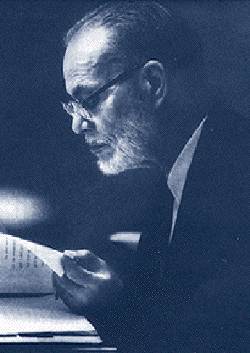 By Yasser Latif Hamdani
By Yasser Latif Hamdani
Last week (February 6) marked the 114th Birthday of one of Pakistan’s greatest unsung heroes. Once again, there was no mention of commemoration of his remarkable like. No sense of gratitude from a nation for which he did so much. He has been wiped out of our memory because he was an Ahmadi, despite his glorious contributions to Pakistan and its cause (see related post on Dr. Abdul Salam).
Sir Zafrullah Khan’s services rendered to Muslims of India, Pakistan and the Third World are second only to that of Quaid-e-Azam Mahomed Ali Jinnah. As a jurist, a diplomat and a patriot he stood head and shoulders above the lesser men who have made a mockery of our republic.
Born in 1893 in Sialkot in what was to become one of the earliest Ahmaddiya households, this small town boy rose to be one of the shrewdest legal minds of his time. His early education was in Sialkot, after which he proceeded to Lahore for his bachelors degree, under the tutelage of none other than the great Iqbal himself. He got his law degree from King’s College London in 1914, where he stood top of his class and was the first person from the Indian subcontinent to do so. He was, like most great figures of that time, called to bar at Lincoln’s Inn.
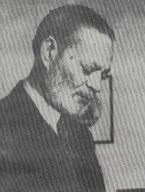
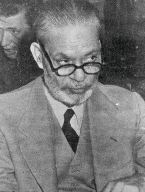
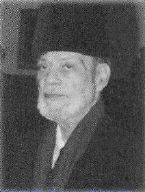


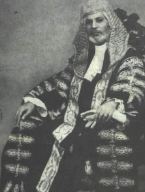
As a practicing lawyer, he soon proved his mettle and had many reported cases to his name. The first major politician to recognize Zafrullah’s talents was Sir Fazli Hussain, the founder of Unionist Party of Punjab. Starting his career in his early 30s as a member of the Punjab legislative Council, he rose to prominence as an indefatigable crusader for Muslims of Punjab. Later he represented the Muslims at round table conference and crossed swords with figures like Jinnah and Gandhi. In 1931, he became the Muslim League president and at the roundtable conference, he cornered no less a person than Churchill in a committee hearing who was forced to accept Zafrullah’s point of view.
Later he was offered a seat on Viceroy’s permanent Council, which he took to further his cause. He also served at varying times as the minister of Railways, Public works, labour and law under the Viceroy. For a brief period, he also became British India’s representative to the League of Nations, just before it was dissolved.
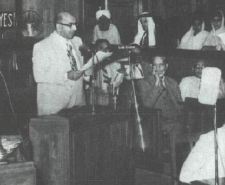
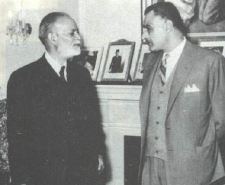
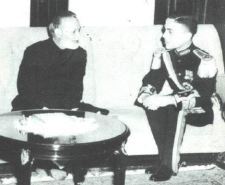
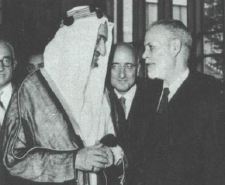
![]()
However his greatest contribution came when he drafted the famous Lahore Resolution, which till this day is the rallying point of Pakistan and Pakistani nationalism. He had been tasked with finding a common point between the popular demand for “Pakistan” and Muslim League’s all India requirements. The Lahore resolution was a broad based solution which left the door virtually open for several solutions and negotiation on the issue of partition. In essence it envisaged 2 or 3 great republics for the Muslim peoples and it was this document which forms the basis not just of Pakistan but also of Bangladesh. For this he got a lot of slack. No less a person than Khan Abdul Wali Khan highlighted Zafrullah’s religious belief to play on the popular conspiracy theory that holds Ahmadis to be British touts.
Later from 1942 onwards, he served as a federal judge (equivalent of an Supreme court C judge) of India and finally took leave on the eve of Pakistan to serve the cause of Pakistan before the Radcliffe Commission, on Jinnah’s personal request. On 25th December 1947, Jinnah appointed him the Foreign Minister of Pakistan. At the UN, Sir Zafrullah emerged as the most eloquent advocate of all third world and Islamic issues. It was Zafrullah whose efforts materialized into the UN Resolutions on Kashmir, which are the basis of the Pakistani case and grievance. Later he became the first Asian president of the International Court of Justice, a singular and unique honor for any Pakistani. He also served, briefly, as the President of the UN General Assembly. He passed away in September of 1983 in Lahore.
A prolific author on the history of Pakistan and Islam, his most famous book was titled “Agony of Pakistan” in which he makes plain the great betrayal which wrested the country from the hands of its patriots into the hands of those who were its greatest enemies. Ironically, today Jinnah’s most trusted lieutenant is not even remembered by the state which owes him so much, including its own founding document. It is the memory of people like Zafrullah Khan that will keep alive the original idea of Pakistan and there is no doubt that one day the posterity will reclaim its true destiny as a progressive and modern republic.
Yasser Latif Hamdani is a lawyer in Lahore and a researcher of the history of the Pakistan Movement.



















































Although MU, u didn’t responded any question asked by Truefact but he started misquaoting the lies here. Mr. MU here it is high need to correct the historic record,
Certain quarters try to make an impression that Sayyid Abul A’la Maududi and Jama‘at-e-Islami had opposed the creation of Pakistan. Though it is a lie and, therefore, not worh-talking, it is necessary to present facts for setting the record straight.
Sayyid Maududi was primarily a thinker, a scholar and a social reformer. He was not a “politician” in the currently understood sense. Maulana Maududi was not involved in active politics in the pre-independence era. During that period his contribution was in the field of reconstruction of Islamic thought, analysis of the malaise that plagued the Muslim Ummah and spelling out a strategy for their revival through an Islamic revolutionary movement.
Second, it may also be stated as a matter of fact that Maulana Maududi neither opposed Pakistan Movement nor did he practically participate in it. He had his differences with the way the Muslim League had organized the movement.
In support of this thesis we may quote the late Dr. Ishtiaq Hussain Qureshi, a leading historian and a leader of the Muslim League (He served in the federal cabinet formed by the founding fathers of Pakistan). Dr. Qureshi in his book Ulema in Politics (Karachi: Ma‘arif Ltd., 2nd edition, 1974) says: “Maulana Abul A’la Maududi’s writings played an important role in molding the opinions of religious minded sections” (p. 330).
search terms like mullah,ahmadi,secularism etc and pakistaniat.com appears on either end of the first or 2nd page of google. If this was all about then congrats, they got succeeded ,if not then I am afraid that sooner or later this site would be recognized as a forum of preaching such things. Those who claim otherwise and reject the idea that majority of the content[including comments] is not promoting anti-religion things are actually living in Alice’s Wonderland.
Treacherous Ulema
How the Ulema helped the Kashmir cause, one has to quote only the “Great” Moulana Moudoodi, the great Amir of Jamat Islami as quoted by Sardar Shaukat Hayat in his book ‘The Nation that lost it soul’:
[quote]I conveyed the message of Quaid Azem to him [Maudoodi ed.] requesting him to pray as well as support Pakistan’s cause. Moulana replied: “How could he pray for “NA – PAKISTANâ€
The Chief Justice of Supreme Court of Pakistan, Mr Justice Muhammad Munir, who was also a member of the Boundary Commission, in his report, commonly known as Munir Report on 1953 civil disturbances, says:
[quote]The President of this Court (court inquiring into the 1953 disturbances) who was a member of the Commission considers it his duty to record the gratitude to Ch Zafrulla Khan for valiant fight he put up for Gurdaspur. This is apparent from the record of the boundary Commission. For the selfless services rendered by him to the Muslim community, it is shameless ingratitude for anyone to refer to Ch Zafrulla Khan in a manner in which he has been referred by certain parties before this court.[/quote]
(Munir report 197)
Mr. Abdul Rahman Azzam, the Secretary General of the Arab League, in his letter, dated November 15, 1951, observes:
[quote]Reading in my bed your speech in the Assembly, I prayed to God to save you and preserve your health for long years in the service of Islam. My congratulations on your clear, human and Islamic statement from the world rostrum.[/quote]